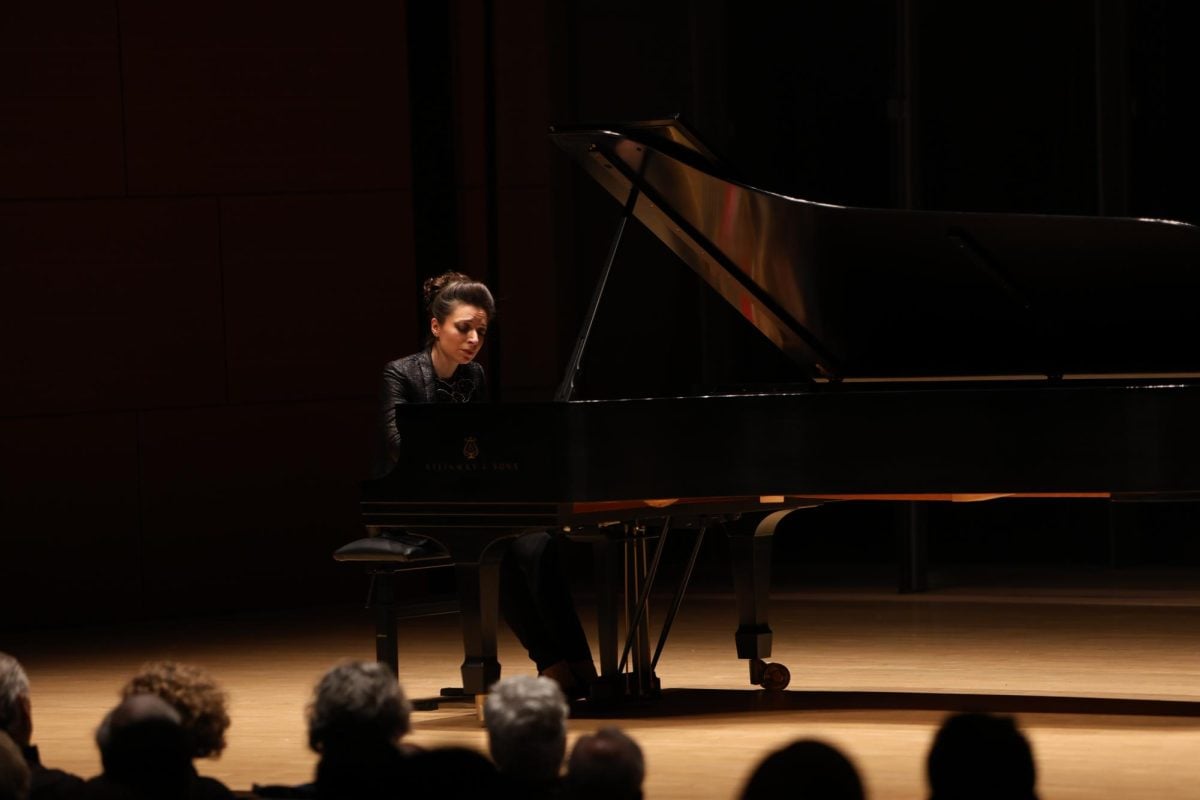Against the lustrous backdrop of Lake Michigan, pianist Yulianna Avdeeva took the Galvin Recital Hall audience on a journey of imagination and rumination through the music of Frédéric Chopin and Sergei Rachmaninoff.
The winner of the prestigious 2010 International Chopin Competition, Avdeeva performed as part of Bienen School of Music’s Skyline Piano Artist Series.
Avdeeva opened with Chopin’s “Polonaise-Fantasie.” Rather than emphasizing the “Polonaise” — a traditional Polish dance — Avdeeva let dance rhythms accompany the wandering melodies and frequent tempo changes of the “Fantasie.” Sometimes Avdeeva’s right and left hands were subtly offset, an imaginative touch that created a sense of exploration.
The following piece, Chopin’s “Barcarolle,” a reimagination of Venetian boat songs, exemplified Avdeeva’s characteristic restraint and subdued grandeur.
After a nuanced, poignant performance of Chopin’s “Prelude in C-sharp minor,” Avdeeva launched without pause to his “Scherzo No. 3.” The interplay between serene spontaneity and tumultuous outbursts in the Scherzo mirrored the imaginative and fiery performance of Rachmaninoff that would come later.
The first half ended with Chopin’s “Andante spianato et grande polonaise brillante.” Here, Avdeeva tackled difficult passages with grace and ease, and relished stately dance rhythms in stark contrast to the “Polonaise-Fantasie.”
After a brief intermission, Avdeeva opened with Rachmaninoff’s “Seventh, Eighth, Ninth and Tenth Preludes, Op. 23.” The four preludes were performed in reverse order, and upon listening to Prelude No. 10, it was clear why. This piece seemed like Rachmaninoff’s homage to Chopin, an effective bridge between Chopin’s dream-like lyricism and Rachmaninoff’s own dense, colorful textures.
The next three preludes allowed the audience to fully transition into Rachmaninoff’s world. An avalanche of breathless, cascading chains of notes were combined with unpredictable harmonic changes. Avdeeva was never carried away, again displaying noble poise and control throughout these pieces.
A cataclysmic descent to the low B-flat — the loudest note of the night yet — opened the final piece: Rachmaninoff’s “Piano Sonata No. 2.”
The first movement featured swirling musical lines that merged, separated and intertwined without pause. Even in the climax, full of huge chords and heightened emotion, Avdeeva’s sound was grand and expansive, yet never harsh.
The second movement was characterized by spacious reverie and heart-tugging melodies faintly reminiscent of Chopin. While Chopin shined most in simplicity and restraint, Rachmaninoff thrived in lush orchestral effects and dense, sweeping gestures spanning the entire piano.
The third movement alternated between disorienting musical blurs and moments of lyricism, leading to a glorious, enraptured conclusion that made the audience leap out of their seats in joyous applause.
Avdeeva thanked attendees by gifting them an encore of Władisław Szpilman’s Chopin-inspired “Mazurka,” a 1942 piece that responded to the Nazi Germany ban on Chopin’s music. It was perhaps only fair to end the concert with a piece by a more modern composer, poignantly looking back to Chopin’s time and tipping his hat to the legendary composer.
Avdeeva’s recital presented two different ways of maximizing the potential of a single piano by two different composers. Chopin’s music was the height of polished simplicity, elegance and expression, and Rachmaninov’s was awe-inspiring in its imposing, orchestral qualities, technical demands and coherence in complexity. It was a feast for the ears to remember.
Email: benkim2026@u.northwestern.edu
Related Stories:
— Bienen takes on the Fab Four with ‘A Beatles Songbook’
— Jonathan Bailey Holland named Bienen School of Music Dean
— Bienen dual degree students balance workload, pursue interdisciplinary passions



















